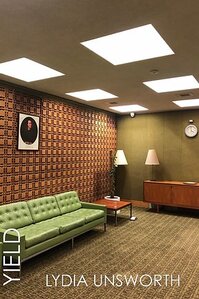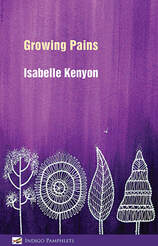 Lydia Unsworth's chapbook, Yield, is described as 'mashed together', 'a call-and-response with the Tao Te Ching' and 'a stretch back and forth between, across, and within the texts' written over a period of one month. To me, they felt like streams of consciousness at times, arguments and counter-arguments, whilst also exploring and redefining meaning. There was a strong call of nature in the pieces, especially in relation to how humans interact with it. For instance, I loved lines such as, 'I want to trample over 7000 hectares of your crops, take what I need,' and 'When I die, leave me in a sun-roofed sinkhole, fondue to your foundations.' The poems are full of need, fervent passion and melancholy. Nature is sometimes 'Up to no good,' or wistful through the eyes of art: 'Stars like gasps of not.' I loved the deep embedded feel of nature amidst the strange pull to city life, and a constant cycle of being drawn back to nature in one way or another: 'Take me to a field of weeds, so that I, too, can untether.' Relationships were also closely linked with the natural world, mirroring its unyielding power. For instance, in Therefore, Look, she writes, 'Come on, let us foot it out of here together, real as crops, tall grass in our eyes and sails.' There are also darker images linked with the earth and water: 'Drown me in your middle-ground, and, 'I grasp the formless form, that is, the gulf (gulp), that lies (dare I?) between us, and what I want is thick and fast and full of guts and lust and anything congealed enough to be called stuff.' This last line is almost medical and embedded, which brings me onto another thread in Yield: motherhood. Thoughts on what it means to be a mother seem peppered throughout this pamphlet. From discussing a child in relation to 'Raw leaves... all worryingly wild,' to how Unsworth is 'mud and gory splattered' but gathers up 'her offspring.' In these parts, the very real and difficult aspects of parenting seem to be emphasized. I also felt at points that some of it was a mother talking to her child, almost like a fable on life in poetry form, which gave Yield a tender thread. The form of writing and Unsworth's style also gave way to the examination of meaning and words. A big concern was focused on being misinterpreted, either intentionally using absurdity and humour, or misunderstood due to others’ interpretations. For example, 'I said it... but I did not say it well,' in relation to legislation, alluding to the mistakes that can be made by those taking your words in the wrong way. Unsworth even offers a summary of herself in one poem: 'I am just a girl who says what she feels, who picks up indiscriminate after-objects on the beach, who still turns her head a touch too quickly if somebody calls her (a) name.' Amidst all the jarring and fantastic images, the art and nature, the comments on everyday life, one of my favourite lines is, 'Shine a line in every corner of my heart,' which was simple but I think a good reflection of these poems. Underneath and in-between all the words, even the absurd commentary, was a strong sense of heart binding it all together. To read more and buy a copy of Yield, visit the KFS website Follow Lydia on Twitter: @lydiowanie
1 Comment
 Isabelle Kenyon’s pamphlet, Growing Pains (published by Indigo Dreams in 2020), is an exploration of childhood, womanhood and personal value. What’s great about Kenyon’s poems is how they are full of contradictions, for instance in her poem When the worms came, she flits between the innocence and feral nature of children in one short poem. There are the ‘jackals, brandishing sticks’ alongside those who ‘offered their squatting form / a shield’. She also has the delightful ability to give us a dark turn, for instance in the same poem, which ends with ‘and enacted Lord of the Flies / with their worms as Piggy.’ While Kenyon also discusses what it means to be a woman and how society often views them in This is a man’s, man’s, man’s world: ‘measured for worth… from hip to hip to birth a child / hymen intact?’ While in Value, she talks about women’s worth being judged by ‘the number of boys in bed… the lack of ring on my finger… the space between my thighs’. She encapsulates so many of the feelings women experience on a daily basis, while also throwing in some humour. For instance, in The Periodic Table, she acknowledges how a woman’s body can invoke fear in men, especially in relation to periods. In this simple poem, Kenyon jokes about telling her brother about bleeding from the uterus and how ‘(he’ll thank me one day)’. Moreover, Kenyon also confronts some of the modern issues we have in the world. From being defined and tracked by our search history and background (‘Value: ‘Soon I am / my search history’), loneliness in an adult world (Spaces: ‘crying in a cubicle quietly’), the pressure to earn money (Sometimes I feel so alive with you I can’t breathe: ‘£ is a weary art’), and consent (Cryptic Consent: ‘No is a / sliding scale you negotiated’). Kenyon’s pamphlet is teeming with images, small moments described in detail, but also big concepts and issues, leaving the readers wanting more. She expresses herself with honesty and a mixture of delicacy and sharpness, which is not an easy task! I look forward to reading more of her work in the future. To read more and buy a copy of Growing Pains , visit: Fly on the Wall Press (for a signed copy!) Follow Isabelle on Twitter: @kenyon_isabelle |
Short reviews of books I've enjoyed and author interviews Archives
January 2022
Categories |
Member of the Society of Authors
Copyright © 2019 onwards · All Rights Reserved · Nikki Dudley
Proudly powered by Weebly
 RSS Feed
RSS Feed